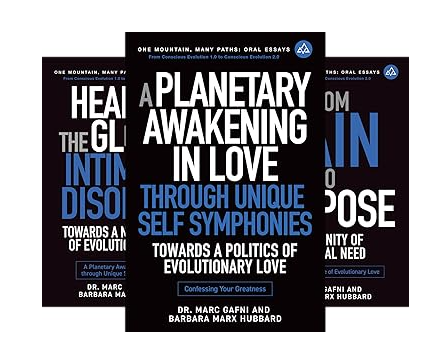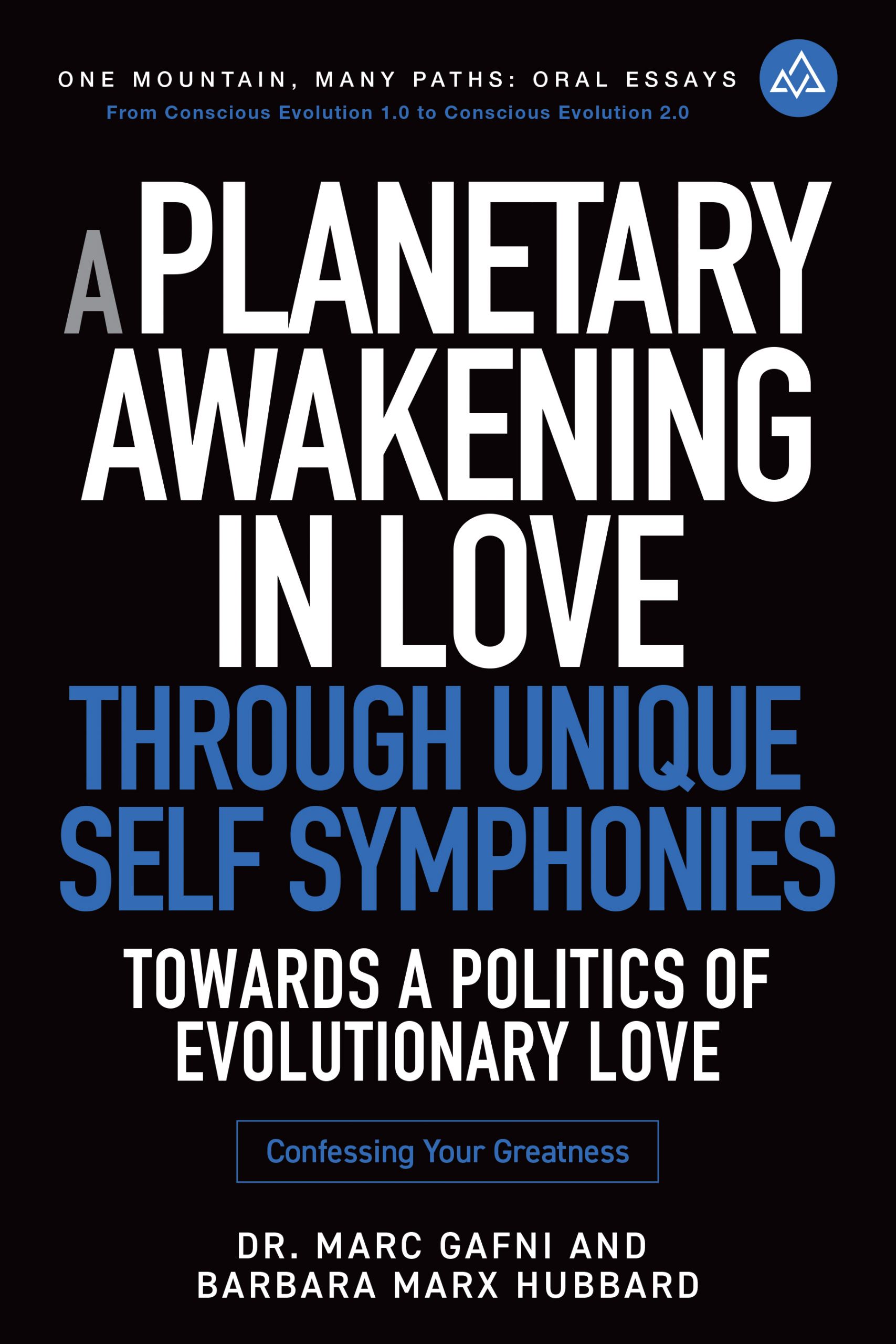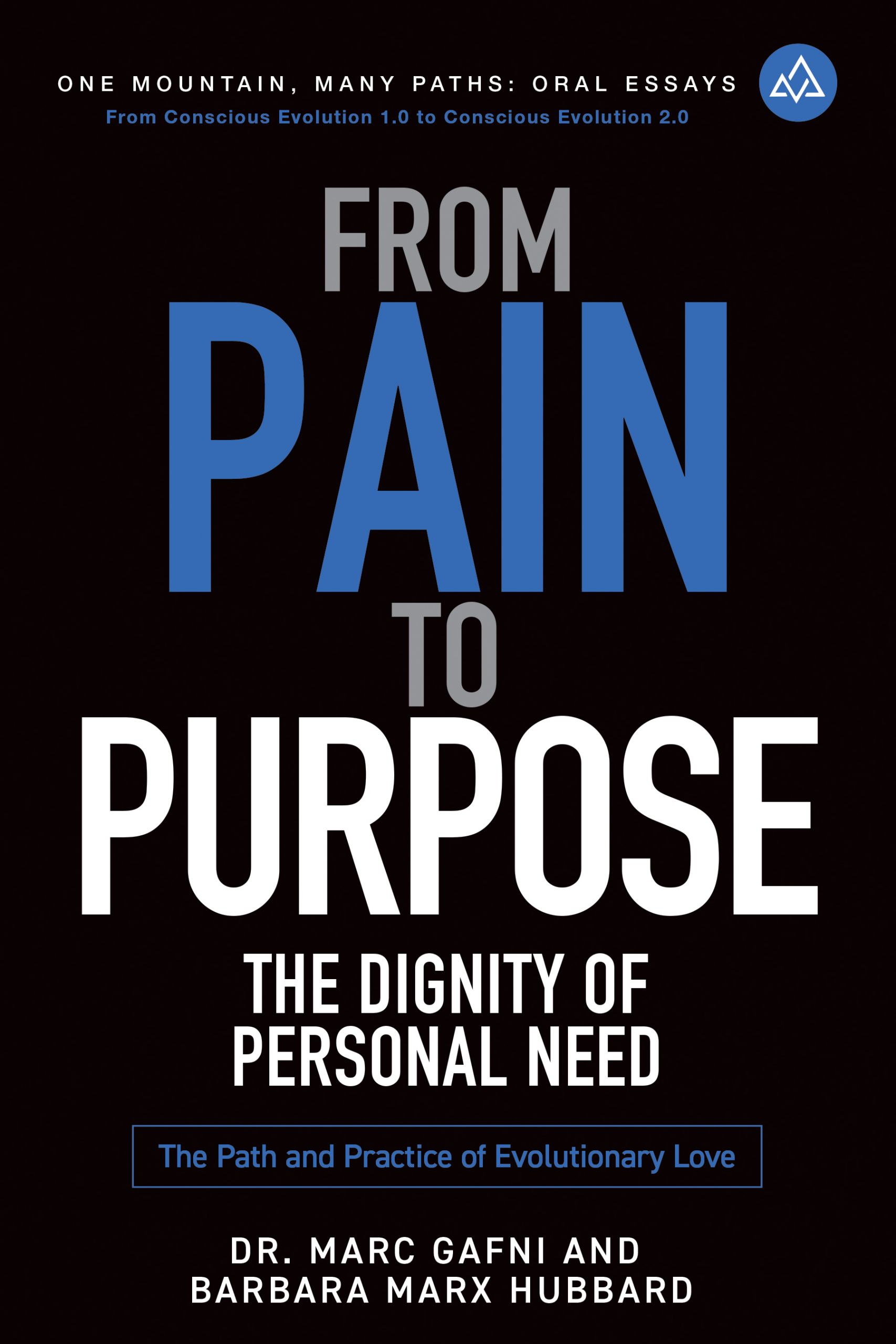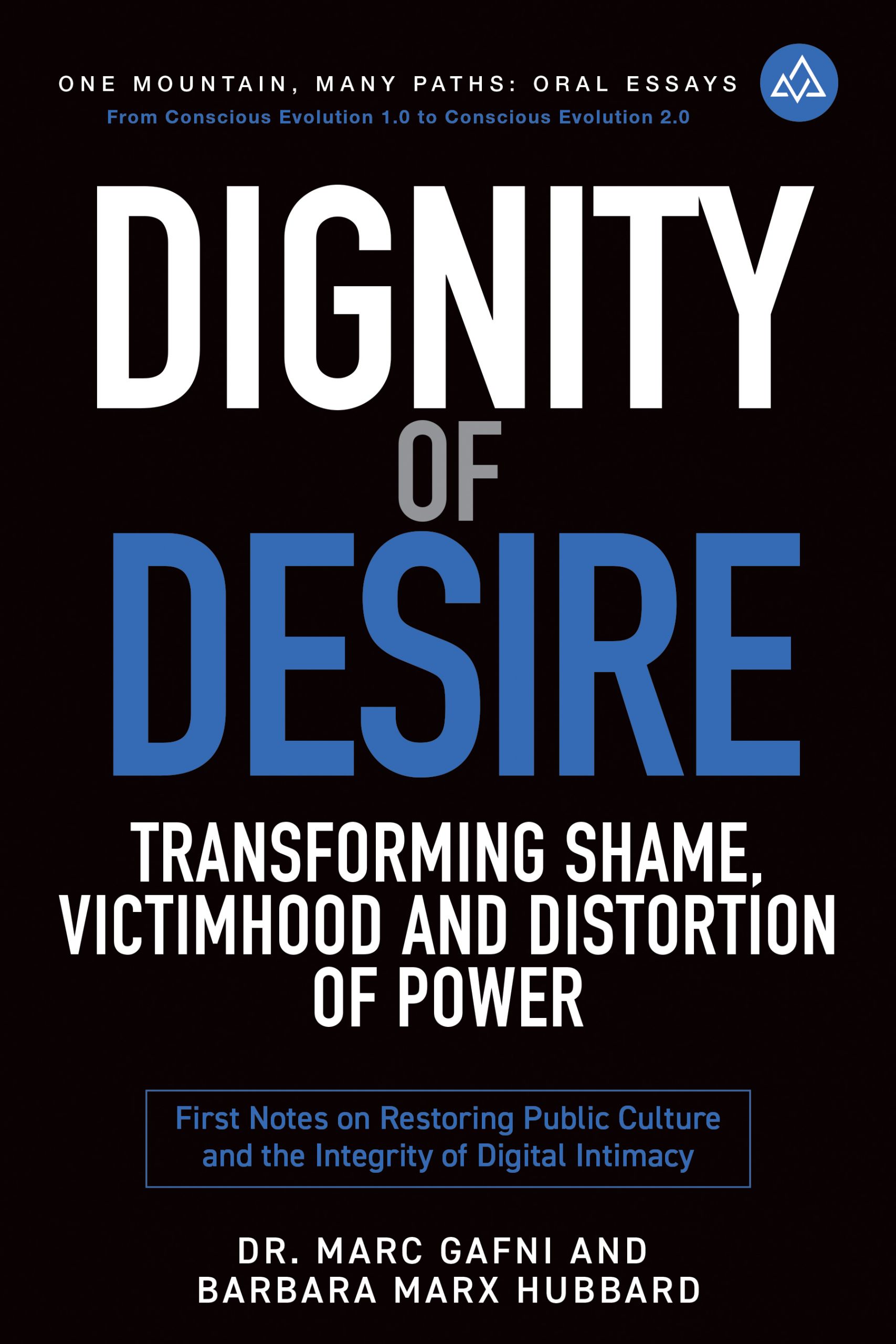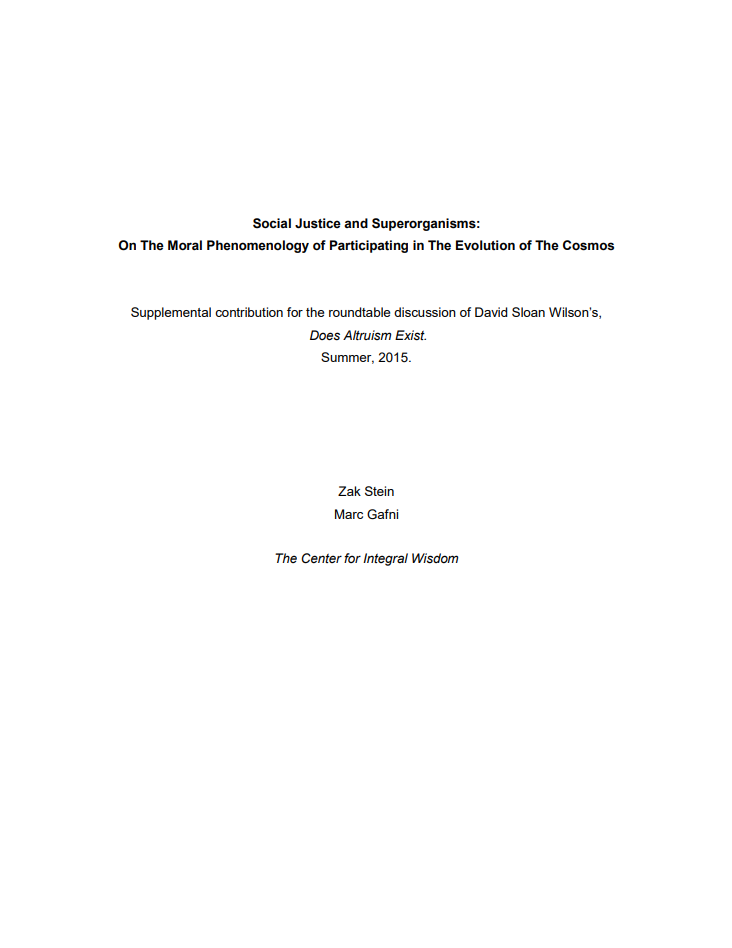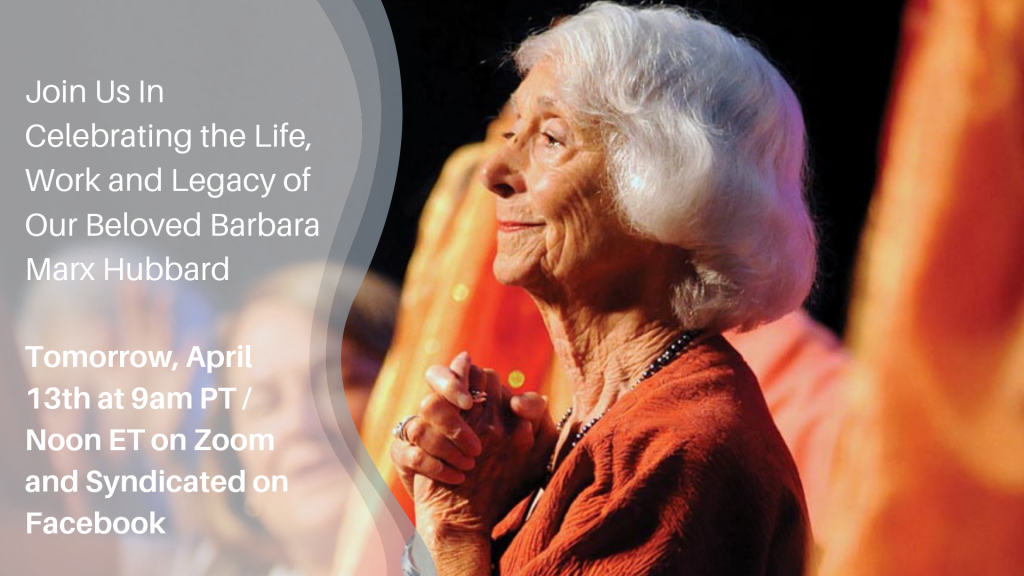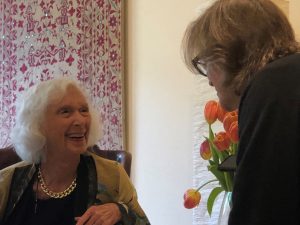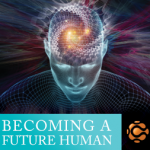A Planetary Awakening in Love Through Unique Self Symphonies | One Mountain Oral Essays | Dr. Marc Gafni and Barbara Marx Hubbard
A Planetary Awakening in Love explores Unique Self Symphonies, the Politics of Evolutionary Love, and Homo Amor through the voices of Dr. Marc Gafni & Barbara Marx Hubbard.
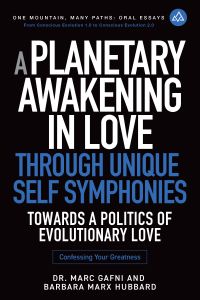
We live in a world of outrageous pain, and the only response to outrageous pain is Outrageous Love. Somehow, we know inside that this is true. The deepest pleasure of being alive is to recognize that Reality is an Outrageous Love Story.
This book is about a Planetary Awakening in Love, the emergence from Homo sapiens to Homo amor. As humans we are here to articulate and enact a new story, to participate in the evolution of love itself. With practice we can learn to place our attention on the evolutionary impulse that is alive and awake in us, as us, and through us, and calling us forth to become Evolutionary Lovers.
In this book, we are reclaiming practices of prayer, intimacy, and the sacred as part of a new politics of Evolutionary Love. This is the only way for us to move beyond separation towards a planetary coherence of synergy and wholeness.
This book explores the essential question: Who are you? The response is both simple and complex: You are an irreducibly unique expression of the Evolutionary LoveIntelligence of Reality itself, and as such you have a unique gift to give to the world, that only you can give! Each of us is an irreducibly unique expression of the LoveIntelligence and LoveBeauty of
All-That-Is, with a unique gift to give in the Unique Self Symphony. Through the lens of Evolutionary Spirituality, it becomes clear that the Universe is not a random accident. Not at all. It is an Evolutionary Love Story, moving towards ever greater intimacy and ever greater wholeness.
We are personally implicated in the great story of Reality, holding the power to transform crisis into possibility through the force of Outrageous Love. As we move into the fullness of our humanity, our personal story emerges as a chapter and verse in the Love Story of Reality itself.
Loneliness is a profound evolutionary driver, urging us to move beyond isolation into deeper connection and to say YES to the impulse of evolution within us. We are not meant to walk this path alone. The move from loneliness to loving takes us beyond the illusion of separation, and we find ourselves woven into the fabric of Unique Self Symphony.
Practice helps us to connect with the sacred at a higher level of consciousness, reclaiming devotion, evolutionary prayer, and the radical knowing that we are held by God as the Infinity of Intimacy.
Together we join genius in Unique Self Symphony—where each unique voice is radically needed, and each unique gift is desired by All-That-Is. We stand at the edge of history, as Evolutionary Lovers and co-creators of a new humanity. We learn to say Yes to the impulse of Evolutionary Love within us, to recognize that we are not separate but part of an interconnected field of intimacy, responsibility, and transformation.
Are you ready to step into this next great moment of human becoming? To say Yes to the evolutionary impulse within you? To respond to the crisis of our time with the only force great enough to meet it—Outrageous Love?
If your heart has brought you to explore this path, welcome to the Planetary Awakening in Love through Unique Self Symphonies!
These oral essays are edited talks delivered by Dr. Marc Gafni and Barbara Marx Hubbard between October and December 2016.
Published by World Philosophy and Religion Press in conjunction with Integral Wisdom Publishers.
Book details:
Title: Author: Dr. Marc Gafni and Barbara Marx Hubbard
Series: Oral Essay Series – Volume 2
Publisher: World Philosophy and Religion Press in conjunction with Integral Wisdom Publishers.
ISBN-13: 979-8888340042
Formats: Paperback, e-book, audiobook.
Table of Contents
CHAPTER 1 NURTURING THE UNION OF HUMANS AND THE EVOLUTIONARY IMPULSE
- The Emergence of the New Human and the New Humanity
- Reclaiming Prayer at Higher Levels of Consciousness
- The Exile of Love
- Evolutionary Chakra Meditation
- Awaken to the Deepest Pleasure of Being Alive
- Hope Is a Memory of the Future
- We Live in a World of Outrageous Pain
- What Is Outrageous Love?
- The Great Question of Meaning Is Who Are You?
- Unique Self Symphony as an Expression of the Self-Organizing Universe
CHAPTER 2 THE GREAT QUESTION OF MEANING: WHO ARE YOU?
- Accessing the Evolutionary Impulse Within
- Prayer: God Lives Both in Us and Holds Us
- Planetary Awakening Through Unique Self Symphony
- The Practice of Evolutionary Chant
- We Are Outrageous Lovers
- Confessions of Greatness
- Reality Is an Outrageous Love Story
CHAPTER 3 A WORLD INFUSED WITH EVOLUTIONARY LOVE
- Metamorphosis From Homo sapiens to Homo amor From a Fundamentalist God to an Evolutionary God
- Evolutionary Prayer: The Infinite Force of Cosmos Knows Your Name
- From Parliamentary Procedure to a Politics of Evolutionary Love
- A Politics of Evolutionary Love Is a Politics of Unique Self Symphony
- A Politics of Evolutionary Love Is a Politics of Evolutionary Intimacy
- Unique Selves Come Together in a Unique Self Symphony
CHAPTER 4 EFFECTING A PLANETARY AWAKENING: A POLITICS OF EVOLUTIONARY LOVE
- Let’s Be Demonstrations of Our Own Conscious Evolution
- When We Talk About Prayer, What Do We Mean?
- Joining Genius to Give Our Gifts More Fully Into the World
- What Is Your Vocation of Destiny?
- Respond to the World That Is Unloved
- Practice Confessions of Greatness
CHAPTER 5 REALITY IS INTELLIGENT AND ALIVE, ENCODED WITH A DIRECTION TOWARDS HIGHER ORDERS OF OUTRAGEOUS LOVE
- We Are Evolutionary Lovers!
- Evolutionary Chakra Meditation
- The Essential Practice of Reclaiming Prayer
- We Are Here to Gentle the Birth to the Next Stage of Evolution
- Your Love Story Is a Chapter in the Love Story of Reality Itself
CHAPTER 6 LONELINESS AS AN EVOLUTIONARY DRIVER
- What Is the Response to Our Aloneness? Emergent World Vision: The Universe Is a Love Story What Fundamentalists Got Right
- The Three Faces of God The Field of Evolutionary Prayer
- Overcoming Loneliness by Saying “Yes” to the Impulse of Evolution Within Us
- Overcoming Loneliness with Purpose
- Moving From Loneliness to Loving Loving Is the Fundamental Driver of Reality The Next Buddha Is a Sangha
CHAPTER 7 THE LIBERATION FROM LONELINESS IS THE LIBERATION OF DESIRE
- The Way of the New Human
- The Universe: A Love Story
- From the Infinity of Power to the Infinity of Intimacy
- The Holy and the Broken Hallelujah
- A Story About Prayer: Ask for Everything!
- Holy Prayers of the Community
- A Call to Action for Homo Amor Universalis
- Nurture the Genius of Humanity in Us
- The Only Response to Outrageous Pain Is Outrageous Love
- Four Noble Truths
- The Liberation From Loneliness Is the Liberation of Desire
- Confessions of Greatness
CHAPTER 8 OUTRAGEOUS LOVE IS A PERCEPTION
- The Great Reconstructive Project
- The Miracle of Hanukkah
- The Sacred Story of Evolution Enacting a Memory of the Future Life Is Ever Evolving
- Outrageous Love is a Perception An Evolutionary Story About a Master
CHAPTER 9 RECLAIMING GOD AS EVOLUTION: BEYOND THE EXILE OF EVOLUTION TO TECHNOLOGY
- Feel the Newness Arising in You Dare to Pray for Newness
- The Synthesis of Technology and Evolutionary Love Interiors and Exteriors Are One
About the Authors:
 Dr. Marc Gafni is a leading public intellectual and teacher impacting the source code of global culture.
Dr. Marc Gafni is a leading public intellectual and teacher impacting the source code of global culture.
Gafni is a visionary thinker, social activist and passionate philosopher. He is known for his “source code teachings”, including Unique Self theory and the Five Selves, the Amorous Cosmos, A Politics of Evolutionary Love, A Return to Eros and Digital Intimacy.
He is author of twenty five books, of which the first ten have been published, including the award-winning Your Unique Self: The Radical Path to Personal Enlightenment.
He holds his doctorate in philosophy from Oxford University, as well as Orthodox rabbinic ordination.
He teaches on the cutting edge of philosophy in the West, helping to evolve a new ‘dharma’ or meta-theory of Integral meaning that is helping to re-shape key pivoting points in global consciousness and culture, with the aim of participating in the articulation of what Dr. Gafni together with Dr. Zak Stein and colleagues are calling CosmoErotic Humanism.
At the core of CosmoErotic Humanism is what Dr. Gafni and Dr. Stein are calling ‘First Principles and First Values’, Anthro-Ontology and a “Universal Grammar of Value”.
This is the ground of a new shared universe story and a new narrative of identity for the new human and the new humanity. This is what they are calling the emergence from Homo sapiens to Homo Amor.
This shared story rooted in First Principles and First Values can then serve as the matrix for a global ethos for a global civilization.
Gafni is considered by many to be a kind of Einstein of Philosophy who is leading a team of thinkers articulating a new vision of meaning for the world.
Dr. Gafni is the Co-Founder together with Ken Wilber and Sally Kempton of the Center for World Philosophy and Religion where he serves as its co-president. Together with Dr. Zak Stein, they are co-leading a team of thinkers, articulating a new vision of meaning for the world.
In 2014 Dr. Gafni co-initiated the Success 3.0 Summit and Rise Up movie, whose method and movement is to bring together key thought leaders and change-agents to collaboratively evolve a bold new Integral vision of Success, rooted in the entrepreneurial values of Wake Up, Grow Up, Show Up, and Outrageous Love.
Over the past 30 years, Dr. Gafni has developed evolutionary and activist programs rooted in his commitment to what he has termed “participating in the evolution of love.” Together with author and social innovator Barbara Marx Hubbard, he is working on a series of new works revolving around Evolutionary Spirituality.

As co-founder and president of the Foundation for Conscious Evolution and the chair, for the last five years of her life, of the Center for World Philosophy and Religion, she posited that humanity was on the threshold of a quantum leap if newly emergent scientific, social, and spiritual capacities were integrated to address global crises.
She was the author of seven books on social and planetary evolution. In conjunction with the Shift Network, she co-produced the worldwide “Birth 2012” multimedia event. She was also the subject of a biography by author Neale Donald Walsch, The Mother of Invention: The Legacy of Barbara Marx Hubbard, and the Future of “YOU”. Deepak Chopra called her “the voice for conscious evolution.”
In 1984, she was symbolically nominated for the vice presidency of the United States. She also co-chaired a number of Soviet-American Citizen Summits, introducing a new concept called SYNCON, to foster synergistic convergence with opposing groups. In addition, she co-founded the World Future Society and the Association for Global New Thought.
Gafni is a leading public intellectual impacting the source code of global culture. He is also a forger of new trails in the evolution of intimacy and love. In his own self-description, “Like all of us I am a flawed human being, an imperfect vessel for the light, radically committed to constant healing, transformation, and the evolution of love.” He has led international spiritual movements and learning communities, as well as created and hosted for several seasons a popular national Israeli television program on culture, meaning, and spirit on Israel’s leading network. Over the past 30 years, Dr. Gafni has developed educational programs, papers and content rooted in traditional wisdom and yet fully adapted to the needs of the contemporary world.
Explore more:
Explore the Great Library:
Center for World Philosophy & Religion – Oral Essay Series → https://worldphilosophyandreligion.org/books/
Learn about the full Oral Essays series:
Complete Oral Essay Series → Oral Essays from One Mountain, Many Paths by Dr. Marc Gafni and Barbara Marx Hubbard
Dr. Marc Gafni Official Website:
https://marcgafni.com/
Center for World Philosophy and Religion:
https://worldphilosophyandreligion.org/
Free Weekly Broadcast with Dr. Marc Gafni:
https://www.onemountainmanypaths.org/
Join the community Who We Must Become:
https://who-we-must-become-3166d4.circle.so/
Free Unique Self Mini Course:
https://www.uniqueselfinstitute.com/the-unique-self-mini-course/
Formal refutations on controversy:
WhoIsMarcGafni.com
Social Media Dr. Marc Gafni:
Substack: https://substack.com/@marcgafni
Instagram: https://www.instagram.com/marcgafni/
YouTube: https://www.youtube.com/c/MarcGafni
Facebook: https://www.facebook.com/DrMarcGafni
Twitter:https://twitter.com/MarcGafni
LinkedIn: https://www.linkedin.com/in/drmarcgafni/
TikTok: https://www.tiktok.com/@drmarcgafni
Learn more about the First Principles & First Values, CosmoErotic Humanism, Unique Self, and Homo Amor at the Center for World Philosophy & Religion.

